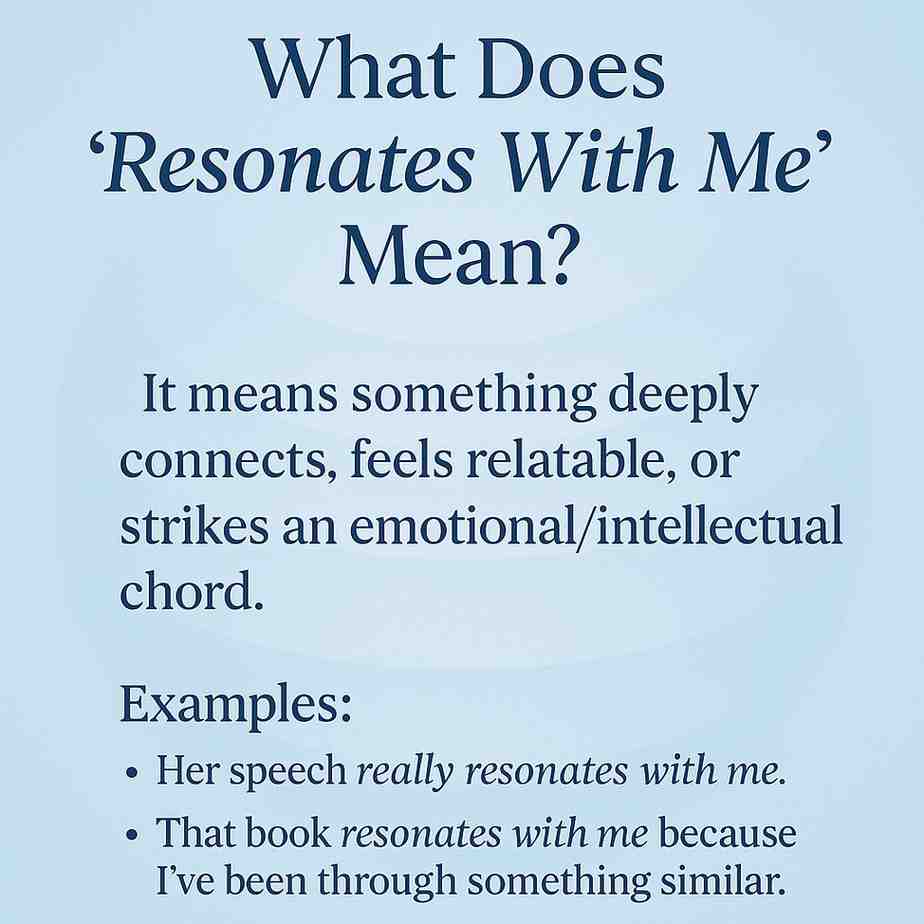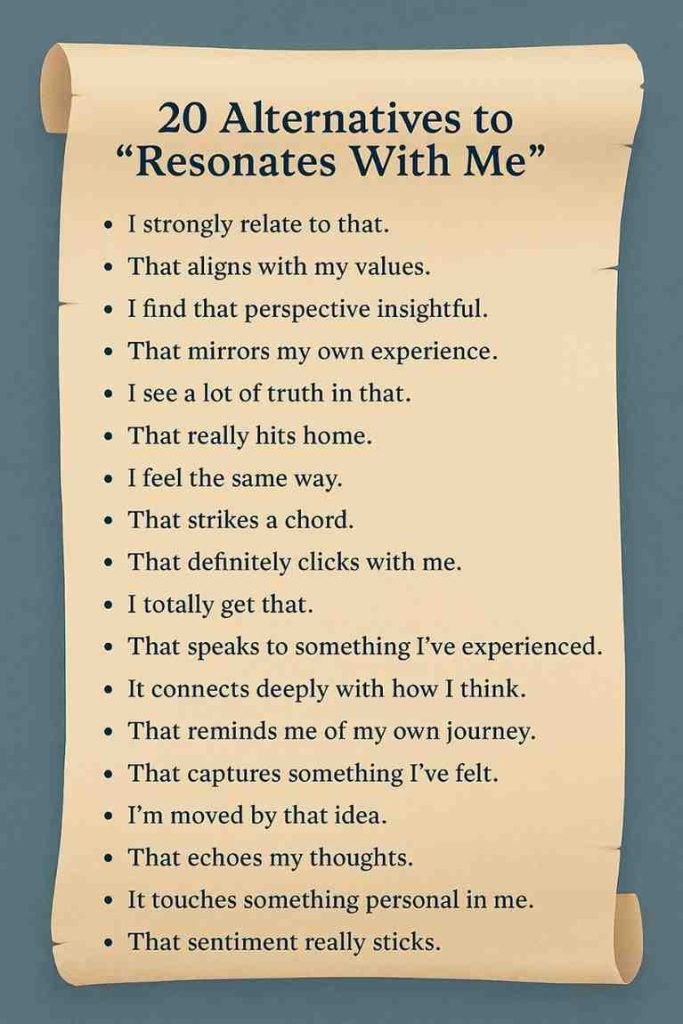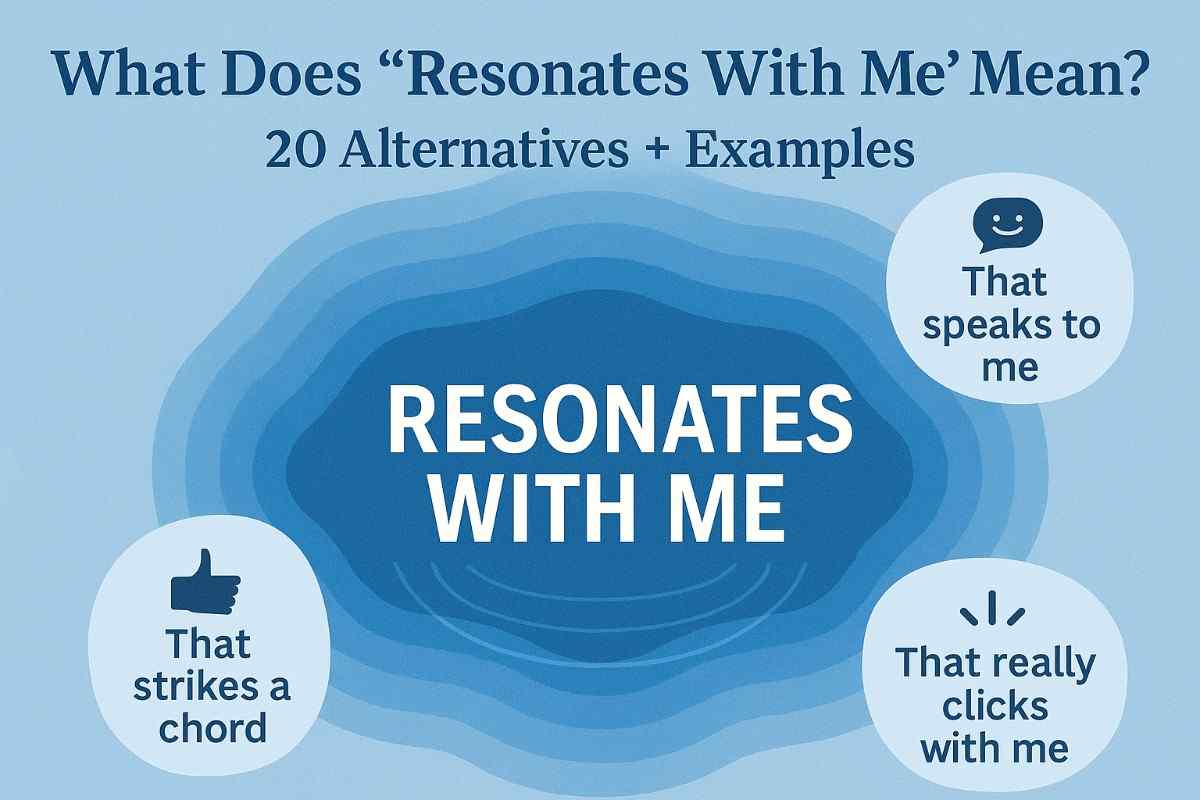What Does “Resonates With Me” Mean? 20 Alternatives + Examples
You’ve probably heard someone say, “That really resonates with me.” It’s a common phrase, especially in conversations about ideas, emotions, or personal values. But what does it really mean? And are there other ways to say it—especially in professional settings?
This guide breaks it all down. We’ll explore the meaning of “resonates with me,” when to use it, and share 20 professional alternatives with clear examples. Whether you’re writing an email or giving feedback, you’ll find simpler, sharper ways to express connection and agreement.
What Does “Resonates With Me” Mean?
“Resonates with me” means something feels right or deeply connects with your thoughts, feelings, or beliefs. It’s like an internal bell rings when you hear or read something that matches how you feel.
It doesn’t mean you like it, necessarily. It means it hits a personal note. That note could be emotional, intellectual, or even spiritual.
Example:
“Her speech about mental health really resonated with me.”
This means the listener felt a deep personal connection to what she said.

When to Use “Resonates With Me”
This phrase works well in many contexts—personal and professional. Use it when you want to express agreement or emotional alignment without saying, “I agree.”
Best times to use it:
- After reading a thoughtful article
- While giving feedback on a talk or post
- During conversations about shared experiences or values
When to avoid it:
- In legal or technical writing (too vague)
- In casual or humorous chats (too serious)
- If you’re not sure what the other person meant
In short, use it when you feel a sincere connection to what was said—and want to show that in a thoughtful, meaningful way.

Also Read – What Does “Watch Your Six” Mean? 20 Alternatives and When to Use It
20 Alternatives to “Resonates With Me”
Let’s face it: “Resonates with me” can feel overused. If you’re writing an email, giving feedback, or commenting online, try these alternatives.
1. That aligns with my thinking
Meaning: You agree and see things the same way.
Explanation: This is more logical than emotional.
Example: “Your approach to client communication aligns with my thinking.”
Best Use: Workplace discussions, strategy meetings
Worst Use: Emotional or personal topics
2. I can relate to that
Meaning: You understand from personal experience
Explanation: Shows empathy and shared feeling
Example: “As a working parent, I can relate to your challenges.”
Best Use: Personal stories, team check-ins
Worst Use: Data-heavy or objective conversations
3. That makes a lot of sense to me
Meaning: You understand and agree
Explanation: It’s a simple, clear affirmation
Example: “Your explanation about the user journey makes a lot of sense to me.”
Best Use: Presentations, brainstorms
Worst Use: Deep emotional discussions
4. I see myself in that
Meaning: You recognize your own story in it
Explanation: Adds a personal touch
Example: “I see myself in your story of switching careers.”
Best Use: One-on-one convos, team bonding
Worst Use: Formal or high-level executive talks
5. That strikes a chord
Meaning: It touched something personal
Explanation: Slightly poetic but still direct
Example: “Your note about burnout really struck a chord.”
Best Use: Feedback or reflections
Worst Use: Analytical reports
6. I connect with that
Meaning: You feel emotionally or mentally linked
Explanation: Neutral, flexible tone
Example: “I connect with your message about inclusivity.”
Best Use: Mission statements, DEI talks
Worst Use: Cold, formal writing
7. That reflects how I feel
Meaning: You share the same emotions
Explanation: Good for sharing common ground
Example: “Your comments on leadership reflect how I feel, too.”
Best Use: Values-based discussions
Worst Use: Jargon-heavy content
8. I agree with your perspective
Meaning: You support their view
Explanation: More analytical than emotional
Example: “I agree with your perspective on remote work.”
Best Use: Meetings, debates, decision-making
Worst Use: When emotional tone matters
9. That mirrors my own experience
Meaning: You’ve gone through something similar
Explanation: Builds connection fast
Example: “That mirrors my own experience with mentorship.”
Best Use: Networking, storytelling
Worst Use: Generic replies or comments
10. I feel the same way
Meaning: Simple, emotional agreement
Explanation: Works best in casual settings
Example: “I feel the same way about team transparency.”
Best Use: Personal messages, informal chats
Worst Use: Formal writing
11. That’s exactly how I see it
Meaning: Strong agreement
Explanation: Shows unity in viewpoint
Example: “That’s exactly how I see it when it comes to leadership styles.”
Best Use: Strategy or planning discussions
Worst Use: If nuance is needed
12. You put into words what I was thinking
Meaning: They said what you couldn’t
Explanation: Warm and appreciative tone
Example: “You put into words what I was thinking about burnout.”
Best Use: Feedback, comments, blog responses
Worst Use: Official emails
13. That hits home
Meaning: It’s deeply personal
Explanation: Emotional impact
Example: “That hits home, especially after the year we’ve had.”
Best Use: Empathy-focused talks
Worst Use: Any formal report
14. That’s on point
Meaning: It’s spot on
Explanation: Short, clear praise
Example: “Your message about work culture is on point.”
Best Use: Comments, chat threads
Worst Use: Complex discussions
15. I understand where you’re coming from
Meaning: You get their view
Explanation: Shows emotional awareness
Example: “I understand where you’re coming from with your career path.”
Best Use: Tough conversations
Worst Use: Quick replies
16. That matches my values
Meaning: You share the same core beliefs
Explanation: Ideal for mission-based work
Example: “Your view on team collaboration matches my values.”
Best Use: HR, leadership, DEI
Worst Use: Tactical convos
17. That reflects my experience too
Meaning: Shared background or journey
Explanation: Builds rapport
Example: “That reflects my experience too with growing a startup.”
Best Use: Interviews, storytelling
Worst Use: Short emails
18. That resonates with our audience as well
Meaning: Broader relevance
Explanation: Good for marketers
Example: “This tone resonates with our audience as well.”
Best Use: Branding, copywriting
Worst Use: Personal chats
19. That speaks to me
Meaning: It feels personal
Explanation: Similar to “resonates,” but simpler
Example: “That speaks to me, especially your point on balance.”
Best Use: Messaging, storytelling
Worst Use: Scientific or research papers
20. That sums up how I feel
Meaning: Perfectly matches your emotion
Explanation: Wraps up your viewpoint neatly
Example: “That sums up how I feel about the current workflow.”
Best Use: Feedback, wrap-up statements
Worst Use: Complex analysis
Simple and Polite Responses to “Resonates With Me”
If someone tells you something “resonates with me,” keep your response kind and thoughtful. Here are a few replies that work well:
- “I appreciate you saying that.”
- “Glad it connected with you.”
- “Thanks for sharing that—it means a lot.”
- “I’m happy it resonated.”
- “That’s good to hear.”
- “Your perspective matters—thanks for engaging.”
These replies show you care without overexplaining. Keep it simple and warm.
Conclusion
“Resonates with me” is a powerful phrase—but it’s not your only option. In professional settings, you might want clearer, more specific language to show connection or agreement.
Try using one of the 20 alternatives above. Tailor them to fit the tone of your message, the audience, and your intent. When used right, these expressions help you sound confident, clear, and genuinely engaged.
Language connects people. So the more precisely you express yourself, the stronger your connections become.

A former editor and grammar geek, David Langford has spent years refining the art of clear communication. He combines his journalism background with a knack for teaching, offering straightforward tips to master tricky grammar rules. When he’s not proofreading, he’s probably debating Oxford commas.

